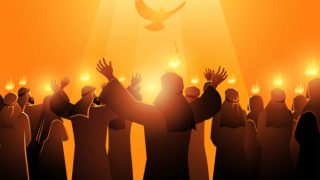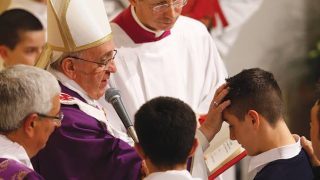
YOU GIVE THEM SOMETHING TO EAT
HOMILY FOR THE SOLEMNITY OF THE BODY AND BLOOD OF CHRIST (CORPUS CHRISTI), YEAR C. Readings: Genesis 14:18-20; Psalm 110; 1Corinthians 11:23-26 and Luke 9:11-17.
Traditionally, this solemnity is celebrated on the Thursday or Sunday after Trinity Sunday with a procession of the Body of Christ. For pastoral reasons, the Church in Nigeria has her procession at the end of the liturgical year, with the feast of Christ the King. It is a day of thanksgiving for the institution of Holy Communion on Maundy (Holy) Thursday, which reminds us of the wonderful gift of God to us through Jesus Christ in the Blessed Sacrament. God gave us first, His Son and through Him asked us to give something to others. This act of giving/offering something cuts across the readings of today.
In the first reading, “Abram offered him a tenth of everything” (Gen 14:20). These were offerings of one’s self in the form of material items. In fact, Abram is a specialist in self-donation (cf. Gen 22:1-18). How he intended to offer His only son Isaac as a sacrifice to God. Seeing the faith of Abram, God provided a lamb for the sacrifice. Offering a tenth of everything, he practically gave Melchizedek one-tenth of his assets, not his income. Melchizedek was a priest of God the Most High and King of Salem. He offered Abram bread and wine, and he blessed him.
Though Melchizedek seems like an obscure figure in the Old Testament, he is important as the Psalm of today describes the priesthood of the Messiah as “A priest forever, in the order of Melchizedek of Old” (Ps 110:4). Hebrew 7:3 described Melchizedek as “Without father, without mother, without genealogy, having neither beginning of days nor end of life, but made like the Son of God, remains a priest continually.” Some thought Melchizedek was actually a pre-Bethlehem appearance of Jesus and there are other speculations that have no Biblical foundation. However, we can say in confidence, if Melchizedek was not an appearance of Jesus Himself, at the very least, he is a remarkable type or picture of Jesus, as the gifts of bread and wine foreshadow the Eucharist and the sacrifice of Christ.
The gospel presents to us the feeding of the crowd with five loaves and two fish. In this scene, the disciples said to Jesus, “Send the crowd away, to go into the villages and the country round about to lodge and get provisions…” (v.12) but He said to them, “You give them something to eat” (v.14). The situation was quite critical. Even if they have the money, how could the disciples get a sufficient quantity of baked bread at that time? How many ovens would be required? How many bakers? How much flour? How long will it take the dough to rise? To bake? How could they have transported thousands of loaves of bread? What about water and other facilities? There were insurmountable logistics associated with this event and so they thought it wise to send the crowd away. They were concerned about the crowds, but also concerned about Jesus. A crowd can quickly become a mob if not managed properly.
Despite the thousand and one reasons why the crowd should have been sent away, Christ challenged His disciples by saying, “You give them something to eat” (v.14). He needed them not to rely on what they have but on God. He needed them to offer the little they have and they said they only had five loaves and two fish. They practically repeated the action of the servant of Prophet Elisha who fed the crowd with twenty loaves of barley and fresh ears of grain in his sack. When Elisha said, “Give it to the people and let them eat” the servants said, “How can I set this before hundreds of people?” (2Kings 4:42-43). The real problem is not the lack of food but the lack of faith. At this point, the disciples failed to recognize Christ as the Prophet.
We often have excuses not to be charitable and mostly because we are scared of tomorrow. We are tempted to believe we have nothing to offer in the face of overwhelming need. As Christ urges His disciples to ‘give them something to eat,’ it expresses the offering of His body and blood in the sacrifice of the holy mass. His actions in this miracle express it all. “He takes the bread; He blesses it; He breaks it; and He gives it” (v. 16).
The Lord TAKES the little offered to Him (five loaves of bread and two fish), which appears insignificant to five thousand men and uncountable women and children. Jesus did not turn his back on the five loaves and two fish. He does not laugh at our offer to care for others. He sees our determination to do whatever we can to help. He takes our simple offerings and uses these to provide for more than we could ever imagine, which is the BLESSING. What He needs is our efforts even if it seems insignificant, he can multiply our good effort miraculously. At every Mass, gifts of bread and wine are brought up. They seem to be an insignificant offering. However, God does wonderful things with them. They become His Body and Blood. The BREAKING of the bread shows the power of God to be present in each fragment of the offering that is consecrated. Finally GAVE himself for us as the sacrificial lamb and requests we do this in memory of Him, which the second reading emphasizes. In a peculiar way, let us offer our time to get our Voters Registration Card (PVC) and vote wisely in due time, because through this little act, God can transform Nigeria for the better.
Today’s celebration also helps us to have a rethink on the Eucharist and its importance in the life of the Church. Without the Eucharist, there is no Catholic Church and without the Church or her priest, there is no Eucharist. The Eucharist is the source and summit of our life and faith (Lumen Gentium 11), the center of our celebration, the pillar of the Church (CCC 1324-5). When Christ said, “This is my body… This is my blood” It is NOT a replacement or taking the place of the Bread and wine (ex nihilo – out of nothing) NOR is it substantial dualism (what the Lutherans call consubstantiation). It is for us as Roman Catholics TRANSUBSTANTIATION. That is, by the very words of consecration of a validly ordained priest of the Holy Mother Church, there is an ontological change of the substance of Bread and Wine, which is transformed into the Body and Blood of Jesus Christ (CCC 1411).
While we have our daily food to sustain our physical life, the Eucharist sustains our spiritual life. It gives us the grace to feel forgiven and to be ready to forgive each other. It influences our communal life: the act of coming together around the table is necessary, it is the first sign of communion, after which we receive the sacramental communion. Importantly, it is not encouraged that we bring our offerings to be used as sacrifice in the holy mass, but then sit back when it is time to receive Christ in the Eucharist. Whatever will deprive us of partaking in the Eucharist, let us make efforts to resolve it through the sacrament of reconciliation.
Happy Solemnity of the Most Holy Body and Blood!
Fr. Ken Dogbo, OSJ










